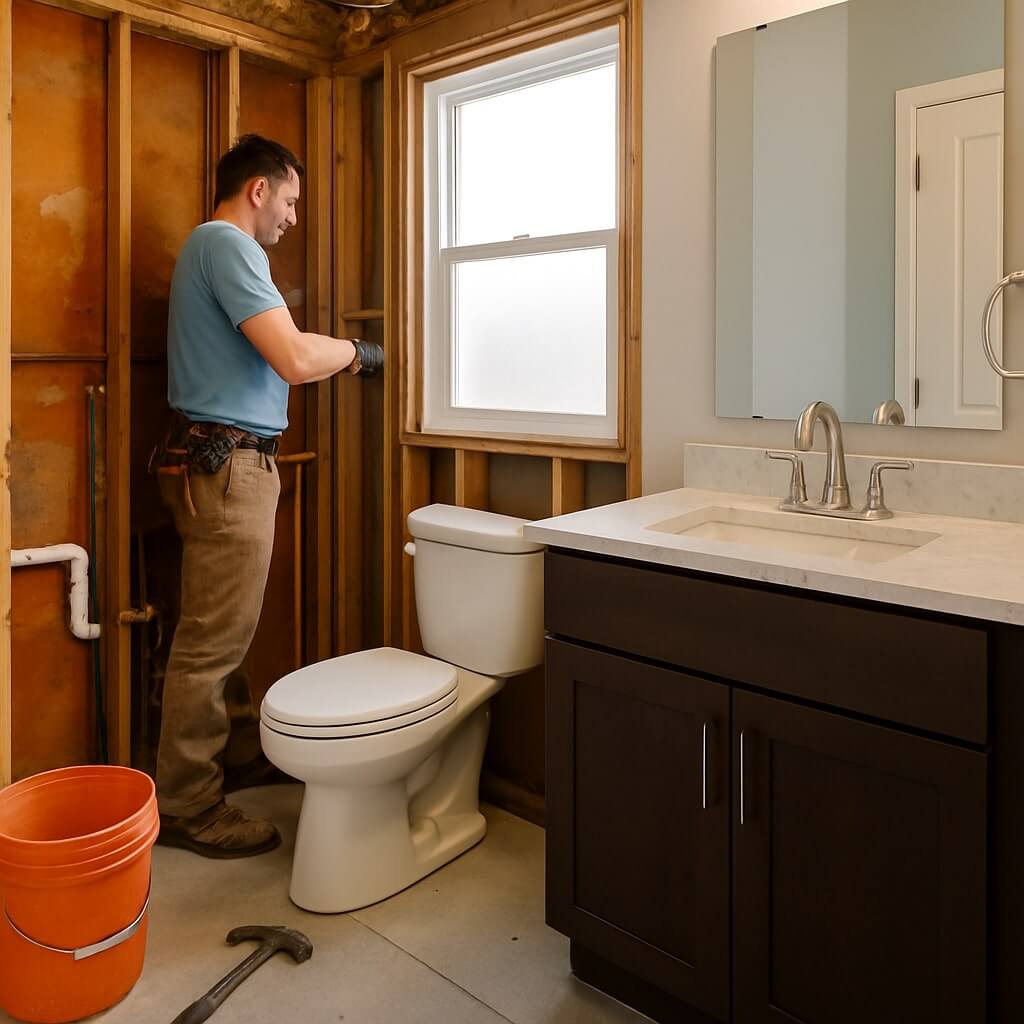A bathroom remodel can dramatically improve the aesthetic and functionality of your home. However, to ensure a smooth renovation process, a well-crafted bathroom remodel contract is essential. This legal agreement serves as a clear blueprint for both the homeowner and the contractor, outlining the scope, timeline, cost, and other critical elements of the project. In this article, we will explore the essential elements of a bathroom remodel contract that homeowners and contractors need to know, helping to avoid misunderstandings and ensure the success of the renovation.
1. Detailed Scope of Work
The scope of work is one of the most crucial elements of a bathroom remodel contract. This section specifies the tasks to be completed, including demolition, plumbing, electrical work, installation of fixtures, and finishing touches. Both parties must clearly define each task involved in the project to avoid disputes later on.
Key considerations for the scope of work:
- Specific Tasks: List out every task, including the removal of old fixtures, plumbing adjustments, tile work, painting, etc.
- Materials and Fixtures: Specify what materials and fixtures will be used, whether provided by the contractor or homeowner.
- Design and Layout: Include details about the design plans, any changes to the layout, and approval procedures.
2. Project Timeline
A well-defined timeline is vital to keep the project on track and avoid unnecessary delays. The contract should outline the start date, key milestones, and expected completion date. A delay clause should also be included to address any unforeseen circumstances, such as material shortages or weather-related issues.
Considerations for the timeline:
- Start and End Dates: Ensure both parties agree on when work will begin and when the project should be completed.
- Milestones: Set specific dates for milestones such as the completion of demolition, plumbing installation, tiling, and final inspection.
- Penalties for Delays: Outline any penalties or compensation for delays caused by either party.
3. Cost and Payment Terms
Clear financial terms are essential to avoid misunderstandings over costs. The contract should include the total cost of the project, payment schedule, and any potential additional charges for unforeseen issues.
What to include regarding cost:
- Total Cost: Provide a detailed breakdown of costs, including labor, materials, and any other fees.
- Payment Schedule: Specify when payments are due, whether it’s upon reaching specific milestones or at regular intervals.
- Additional Charges: Address potential extra costs that could arise from unexpected changes, such as plumbing repairs or design alterations.
4. Licensing and Insurance
Both homeowners and contractors should ensure that the contract includes a section about licensing and insurance. This protects both parties in the event of an accident or failure to meet agreed-upon standards.
Important details:
- Licensing: Ensure the contractor holds the necessary licenses and certifications required by local regulations.
- Insurance: The contractor should have liability insurance to cover accidents or damages that may occur during the remodel.
5. Permits and Approvals
A bathroom remodel often requires permits, especially for structural changes, electrical, and plumbing work. The contract should specify who is responsible for obtaining these permits and ensure compliance with local building codes.
Key points:
- Permit Responsibility: Clarify whether the contractor or homeowner is responsible for obtaining permits.
- Inspection and Approval: Include any necessary inspections and approvals that need to be conducted before moving forward with the work.
6. Warranty and Guarantees
A warranty or guarantee gives homeowners peace of mind, ensuring that any defects or issues with the work will be addressed after completion. The contract should specify the length and scope of any warranties for materials and labor.
Considerations for warranties:
- Labor Warranty: Specify how long the contractor’s work is guaranteed.
- Material Warranty: Include warranties provided by manufacturers for materials like tiles, plumbing fixtures, and other supplies.
- Remedy for Defects: Define the process for addressing defective workmanship or materials.
7. Change Orders
In any remodel, changes may need to be made to the original plan. The contract should outline a clear process for handling changes, ensuring that both parties agree to any alterations and that they are documented appropriately.
What to consider for change orders:
- Written Approval: Any changes to the original scope should be documented and signed by both parties.
- Additional Costs: If changes incur additional costs, these should be specified in the change order.
- Impact on Timeline: Any modifications should address potential delays in the project timeline.
8. Dispute Resolution
Despite best efforts, disputes can arise during a bathroom remodel. The contract should include a dispute resolution clause, outlining how conflicts will be handled, whether through mediation, arbitration, or court proceedings.
Key considerations:
- Mediation or Arbitration: Outline the preferred method for resolving disagreements before pursuing legal action.
- Legal Fees: Specify who will bear the legal costs if a dispute cannot be resolved amicably.
FAQ (Frequently Asked Questions)
A bathroom remodel contract should include the scope of work, project timeline, cost breakdown, payment schedule, licensing and insurance details, permits, warranties, change orders, and dispute resolution procedures.
Yes, but any changes to the original contract should be made through a written change order that is signed by both parties, which should include the new costs and impacts on the timeline.
You can verify the contractor’s license by checking with local licensing authorities. Request proof of insurance before signing the contract to ensure they have adequate coverage.
The contract should specify whether the homeowner or contractor is responsible for obtaining necessary permits. Typically, contractors handle permits related to plumbing, electrical, or structural changes.
The contract should outline penalties or compensation for delays caused by either party, as well as procedures for handling unforeseen delays like material shortages or bad weather.
Conclusion
A bathroom remodel contract is a crucial document that protects both homeowners and contractors, ensuring a clear understanding of expectations, responsibilities, and timelines. By including detailed elements such as the scope of work, payment terms, warranties, and dispute resolution procedures, both parties can avoid misunderstandings and ensure a successful renovation. Homeowners should take the time to carefully review the contract and consult with legal professionals if needed to safeguard their interests and ensure a smooth remodeling experience.




